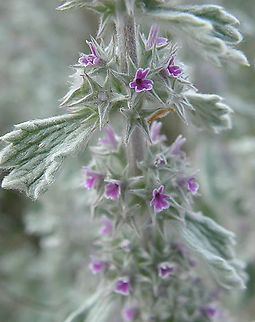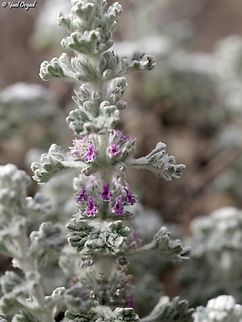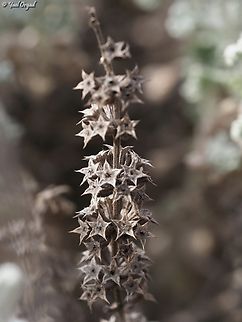
Appearance
It is a herbaceous perennial suffruticose plant 20-45 cm tall, with more or less quadrangular stems, with abundant whitish clothing, often woolly. The leaves, 1.5-4 by 1-2cm, are cuneate, flabellate, irregularly toothed to lobed, somewhat rough on the upper side and with marked veins on the lower side, with a very dense plush covering, whitish and with a petiole of 1 -3cm, very long in the lower ones. The inflorescences, 10-20 cm long, are formed by whorls with 12 or more flowers each, more or less close together, occasionally spiciform. The bracts, 1-2.5 by 0.8-1.5cm, are sessile or not. The flowers, sessile, have a calyx with a 4-5 mm tube, woolly, with 5 wide nerves and 5 teeth of 2-5 mm, triangular, sharp, in the fructification arranged in a star, patent, hardened, sometimes the 2 lower ones somewhat longer; while the corolla, 4-5 mm, is purple, with whitish margins, the upper lip is bifid, narrow, erect, and the lower lip has 2 short and narrow lateral lobes, the central one being semiorbicular, sometimes emarginate, all very hairy outside. The fruits are schizocarpic in tetranucules, with brown mericarps, 2-2.5 by 1-1.5 mm, ellipsoid, flattened, with an acute apex and a crown of hairs at the base.
Naming
Synonyms:Beringeria plicata (Forssk.) af.
Marrubium alysson var. plicatum (Forssk.) Nyman
Marrubium plicatum Forssk.
Spanish common names: aliso de Galeno, herba de la rabia, hierba de Santa Quiteria, hierba de la rabia, juanrubio, manrubio, manrubio pinchoso, marrubio de Orihuela, marrubio estrellado, marrubio-aliso de Galeno, yerba de Santa Quiteria, yerba de la rabia.

Distribution
Algeria, Egypt, Italy, Libya, Morocco, Palestine, Sardegna, Sinai, Spain, TunisiaThe species is native from Spain (in its eastern half with a special concentration in Levante Alicante) to the Middle East (Israel, Jordan and Sinai), passing through southern Italy and Sardinia.
Habitat
It is a ruderal plant that frequently grows in sand, marl, chalky and saline soils, from sea level to 750 m altitude. It blooms from February to June.Uses
Like other species of the genus Marrubium, the plant has pharmacological applications still under study, among which the following stand out, for example and in particular:The effect of extracts of the species on artificially hypercholesterolemic rabbits showed a strong lowering of lipids and a powerful anti-inflammatory and anti-oxidant effect.
Eight flavonoid compounds (diosmetin, diosmetin-7-rhamnoside, chrysoeriol, luteolin, luteolin-7-rutinoside, acacetin, acacetin-7-glucoside and quercetin), isolated from extracts of the species that have been tested in vitro on cancerous tumors (Ehrlich tumor and human tumor U-251 (brain) and MCF-7 (breast)). These tests showed a high anti-cerebral carcinoma activity and rather moderate activity on breast cancer. In addition, the alcoholic extracts of the plant have shown a powerful anti-oxidant action.
Extracts, in various solvents, of M. alysson leaves have shown a certain inhibitory effect against various Enterobacteriaceae and an anti-fungal action against Candida glabrata, Candida albicans, Candida parapsilosis and Candida kreusei.
Non-aqueous extracts of leaves of the species have shown potent antiviral activity against human cytomegalovirus AD-169 and coxsackievirus B type 3 (CoxB-3).
References:
Some text fragments are auto parsed from Wikipedia.
https://www.gbif.org/species/3882151https://powo.science.kew.org/taxon/urn:lsid:ipni.org:names:449832-1
https://es.wikipedia.org/wiki/Marrubium_alysson